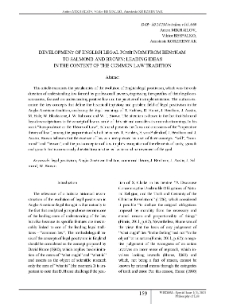Object
Title: Development of English Legal Positivism from Bentham to Salmond and Brown: Leading Ideas in the Context of the Common Law Tradition
Journal or Publication Title:
Date of publication:
Volume:
Number:
ISSN:
Corporate Creators:
Խ․ Աբովյանի անվան հայկական պետական մանկավարժական համալսարան
Coverage:
Abstract:
This article examines the peculiarities of the evolution of English legal positivism, which was the only direction of understanding law formed by professional lawyers, expressing the specifics of their legal consciousness, focused on understanding positive law and the practice of its implementation. The authors examine the key concepts that define the historical trajectory and problem field of legal positivism in the Anglo-American tradition, analyzing the legal teachings of T. Hobbes, D. Hume, J. Bentham, J. Austin, M. Hale, W. Blackstone, J. W. Salmond and W. J. Brown. The attention is drawn to the fact that Salmond lays down objections to the concept of law as a rule of the state and considers its main shortcomings. In his work “Jurisprudence or the Theory of Law”, Salmond presents the flaws and omissions of the “imperative theory of law”, among the proponents of which he names T. Hobbes, S. von Pufendorf, J. Bentham and J. Austin. Brown believes that the essence of law can be expressed by a set of three concepts: “will”, “command” and “reason”, and the just conception of law implies recognition of the elements of unity, growth and growth that is consciously directed towards the realization and achievement of the goal.
Place of publishing:
Երևան
Publisher:
Format:
Identifier:
oai:arar.sci.am:371003
Language:
Object collections:
Last modified:
Oct 8, 2025
In our library since:
Mar 12, 2024
Number of object content hits:
74
All available object's versions:
https://arar.sci.am/publication/400890
Show description in RDF format:
Show description in OAI-PMH format:
-
Իմաստություն=Wisdom=Мудрость
-
Իմաստություն, 2013, N 1
-
Իմաստություն, 2014, N 1 (2)
-
Իմաստություն, 2014, N 2 (3)
-
Իմաստություն, 2015, N 1 (4)
-
Wisdom, 2015, N 2 (5)
-
Wisdom, 2016, N 1 (6)
-
Wisdom, 2016, N 2 (7)
-
Wisdom, 2017, N 1 (8)
-
Wisdom, 2017, N 2 (9)
-
Wisdom, 2018, N 1 (10)
-
Wisdom, 2018, N 2 (11)
-
Wisdom, 2019, N 1 (12)
-
Wisdom, 2019, N 2 (13)
-
Wisdom, 2020, N 1 (14)
-
Wisdom, 2020, N 2 (15)
-
Wisdom, 2020, N 3 (16)
-
Wisdom, 2021, N 1 (17)
-
Wisdom, 2021, N 1 (1) Special issue
- Editorial board
- Contents
- Editor`s Foreword
- Epistemological Aspects of the Organisation of Human Activity in the Transition from Disparate Social Techniques to Societal Technologies
- The Idea of Human Rights: From the Ancient World to the Digital Age
- The Principle of Deliberation as a Key Basis of Statehood in Modern Russia
- The Aesthetic Doctrine of Law (Aesthetics of Law) in the Context of the Development of NBICS Technologies
- The Phenomenological Method in the Ethics and Legal Philosophy of the XX Century
- Genesis and Historical Sense of the Motto “Liberté, Égalité, Fraternité”
- Some Methodological Problems of Preventing Crimes Against Political Rights in Modern Democratic States (Philosophy-Legal Dimension)
- The Legal Status of an Individual in Russian Scientific, Political and Legal Doctrines
- The Influence of the Ruling Elite on Political Activity in the Conditions of Destructuring the Essence of the Philosophy of Law
- The Conventional Nature of Legal Values
- Axiological Aspect of Legal Consequential Thought of the Late 18th – Early 20th Centuries
- Mythologisation of Law by Historical Consciousness
- Dialectics of Philosophical Pillars of the Law and Development Doctrine
- Value and Regulatory Foundations for Digital Transformation of Modern Social Relations: Theological and Conservative Legal Aspects
- Development of English Legal Positivism from Bentham to Salmond and Brown: Leading Ideas in the Context of the Common Law Tradition
- Private and Public Interests in Russian Law and Jurisprudence: Transformation of Approaches
- Legal Theology in Interdisciplinary Discourse
- V. S. Nersesyants’ Political and Legal Ideas about the Rule of Law State and Their Reflection in the Constitution of the Russian Federation and the Constitution of the Republic of Armenia
- Philosophical Foundations for Understanding the System of Law
- Law and Logic: E. Bulygin’s Deductive Pattern of Judicial Reasoning
- Philosophical and Legal Foundations of the Comprehensive Theory of Law
- The Sociocultural Context in Law: Modernism - Postmodernism - Metamodernism
- Authors
-
Wisdom, 2021, N 2 (18)
-
Wisdom, 2021, N 3 (19)
-
Wisdom, 2021, N 4 (20)
-
Wisdom, 2022, N 1 (21)
-
Wisdom, 2022, N 1 (2) Special issue
-
Wisdom, 2022, N 2 (22)
-
Wisdom, 2022, N 2 (3) Special issue
-
Wisdom, 2022, N 3 (23)
-
Wisdom, 2022, N 3 (4) Special issue
-
Wisdom, 2022, N 4 (24)
-
Wisdom, 2023, N 1 (25)
-
Wisdom, 2023, N 2 (26)
-
Wisdom, 2023, N 3 (27)
-
Wisdom, 2023, N 4 (28)
-
Wisdom, 2024, N 1 (29)
-
Wisdom, 2024, N 2 (30)
-
Wisdom, 2025, N 1 (31)
-
Wisdom, 2025, N 2 (32)
-
Իմաստություն, 2013, N 1





